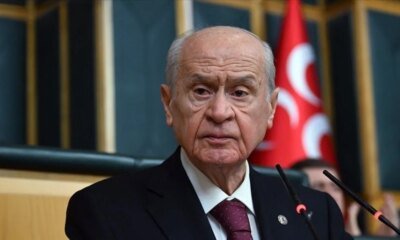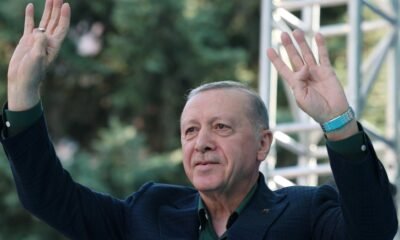Economy
UK inflation jumps in June to its highest in over year
The annual rate of inflation in the U.K. unexpectedly rose to its highest level in over a year, at 3.6% in June, according to official figures released on Wednesday. This potentially makes it a tougher call for the Bank of England (BoE) to cut interest rates next month.
June’s reading from the Office for National Statistics (ONS) – took the annual consumer price index (CPI) rate to its highest since January 2024 – against expectations from economists in a Reuters poll for it to remain unchanged at May’s reading of 3.4%.
British inflation has risen steadily since touching a three-year low of 1.7% last September, and in May the Bank of England forecast it would peak at 3.7% in September – almost twice the central bank’s 2% target.
Sterling rose slightly against the dollar after the data, which may put pressure on the BoE not to cut interest rates at its next meeting in August.
“While we still expect the Bank of England’s Monetary Policy Committee to continue gradually cutting rates, today’s upside inflation surprise means its August decision will be finely balanced,” Martin Sartorius, principal economist at the Confederation of British Industry, said.
Higher costs for motor fuels, air fares and rail fares were the biggest contributors to the rise in the inflation rate between May and June, the ONS said and it also noted an increase in the cost of clothing, shoes, red wine and lager.
Previously, April saw a particularly sharp jump in inflation to 3.5% from 2.6% due to rises in regulated energy and water tariffs, a spike in air fares, and upward pressure on the cost of labour-intensive services from an increase in employment taxes and the minimum wage.
Despite this, Governor Andrew Bailey has said interest rates are likely to remain on a gradual downward path, as a weaker labour market puts downward pressure on wage growth and the outlook for economic growth remains lacklustre.
The BoE has cut interest rates by four quarter-point steps since August, and economists polled by Reuters last month forecast two more quarter-point rate cuts this year, including a likely move in August.
However, some BoE policymakers are concerned that skills mismatches in Britain’s labor market and other supply constraints will keep wage growth running too fast for inflation to return to target any time soon.
Services price inflation, a measure the BoE views as a better guide to domestically generated price pressures than the headline CPI rate, held at 4.7% in June, in contrast to economists’ forecasts for it to fall to 4.6%.
Food and non-alcoholic drink prices were 4.5% higher than a year earlier, the biggest rise since February 2024.
The BoE forecast in May that headline inflation would be back on target in the first quarter of 2027.
Economy
Trump says firing Fed Chair ‘highly unlikely’ but refuses to rule it out
U.S. President Donald Trump said Wednesday he is not currently planning to fire Federal Reserve Chair Jerome Powell but refused to rule out the possibility, raising fresh uncertainty in financial markets.
“I don’t rule out anything, but I think it’s highly unlikely,” Trump told reporters, after months of escalating criticism of Powell’s leadership. “He’s doing a lousy job, but no, I’m not talking about that,” Trump added.
The president’s comments sent the yield on 30-year U.S. Treasury bonds surging above 5% for the first time in decades, while major stock indexes slid and the dollar dropped against the euro.
Trump also signaled that even if he doesn’t act immediately, he would be able to replace Powell when his term ends next year. Powell’s term as chair runs through May 2026, though his term as a Fed governor extends beyond that.
The president has frequently slammed Powell for not lowering interest rates fast enough, labeling him a “numbskull” and a “moron” in recent public remarks.
On Tuesday night, Trump suggested that a proposed $2.5 billion renovation plan at the Federal Reserve could be grounds for dismissal. Asked whether the spending was a fireable offense, he said, “I think it sort of is.”
According to U.S. media reports on Wednesday, Trump told a group of Republican lawmakers he intends to fire Powell and received political support for doing so.
“They expressed approval for firing him. The president indicated he likely will soon,” a White House official told CNBC.
Powell has publicly stated he will not resign and that the central bank’s independence is protected by law.
News of Trump’s remarks rattled financial markets. The dollar dropped 1% against the euro, while gold prices rose as investors sought safer assets.
On Wall Street, the Dow Jones Industrial Average fell 0.2%, the S&P 500 declined 0.3% and the Nasdaq Composite slid 0.4%.
Economy
Fed’s fears start to be realized as tariff costs begin to hit consumers
A broad rise in prices, from coffee and audio equipment to home furnishings, pushed U.S. inflation higher in June, which economists view as a sign that the Trump administration’s escalating import tariffs are being passed on to consumers.
Overall consumer prices rose 0.3% in June, a roughly 3.5% annual rate, after a 0.1% increase in May, official data showed on Tuesday.
Economists – and Federal Reserve (Fed) officials – say they were expecting inflation to gather pace this summer as the lagged impact of tariffs gets passed along by businesses, and the June data suggest central bank policymakers in particular may remain reluctant to cut interest rates until more information is at hand.
The tariff price shock could ultimately prove a temporary, one-time adjustment. But with the final tariff levels still being considered by President Donald Trump, and steeper levies threatened as of Aug. 1, the inflation outlook remains unsettled.
The latest data “showed that tariffs are beginning to bite,” said Omair Sharif, head of Inflation Insights, “apparel prices rose, household furnishing prices jumped … and recreation commodities increased.”
Those are heavily imported items and the increases were substantial.
Prices for audio-video equipment rose 1.1% over the month and have risen 11.1% on a year-over-year basis, the largest jump ever in a category where globalization had generally meant steady or falling prices.
It will likely strike a note of caution for the Fed, which has been facing almost daily criticism from Trump for not cutting interest rates, a step central bankers have been reluctant to take until it is clear where the tariffs will leave the U.S. economy.
Yields on U.S. Treasury securities rose to their highest in about a month, and interest rate futures reflected growing uncertainty that the Fed would resume rate cuts in September, with a model from CME Group showing that decision was seen as a near toss-up after being the baseline expectation for the past month or so.
In a speech in Washington on Tuesday, Federal Reserve Bank of Boston President Susan Collins warned that she continues to expect the rise in import taxes to push up inflation while pushing down growth and employment. But she added that strong balance sheets on both the business and household sides may help absorb the hit and lessen its impact.
“The impact of tariffs may be lessened somewhat by an ability for firms to decrease profit margins and for consumers to continue spending, despite higher prices. As a result, the adverse impact of tariffs on labor market conditions and economic growth may be more limited,” Collins said.
Trump on social media said that consumer prices were “LOW” and repeated his call for the Fed to cut rates. The consumer price level was about 1.2% higher in June compared to December, the last full month before Trump started his second term.
White House Press Secretary Karoline Leavitt said the fact that core inflation, which excludes food and energy prices, increased less than expected, “proves that President Trump is stabilizing inflation.”
Core inflation increased at a 2.9% annual rate in June, slightly below the 3% consensus forecast, but slightly faster than in May. Food and energy costs both increased, pushing headline inflation up to 2.7% from 2.4% the month before.
“With increases in categories like household furnishings, recreation, and apparel, import levies are slowly filtering through,” wrote Seema Shah, Chief Global Strategist at Principal Asset Management. “It would be wise for the Fed to remain on the sidelines for a few more months at least.”
Investors still expect the Fed in September to cut a quarter of a percentage point from the current 4.25% to 4.5% benchmark interest rate maintained since December, but odds of a cut at the upcoming July 29-30 meeting are now below 5%.
Powell had earlier pinpointed this summer as the time when the U.S. central bank will learn if inflation is responding to the tariffs applied on trading partners and various industrial sectors.
So far, the levies have had only a limited impact on inflation, but economists broadly have expected to see them eventually filter into retail prices.
“We know there is a lag between implementation and the inflationary effect,” said Gregory Daco, chief economist at EY-Parthenon. “Businesses manage imports using different processes … We have not seen the full-blown effects of tariffs on CPI data … I would expect to start to see more.”
Clawing back tariff costs
The June CPI data will likely leave the Personal Consumption Expenditures Price Index the Fed uses for its 2% inflation target well above that goal, with increased uncertainty now that Trump has threatened tariff levels of 30% or more on Mexico, Canada and the European Union, and more actions are always possible.
The PCE index outside food and energy rose at a 2.7% annual rate in May; recent Fed policymaker projections see it hitting 3.1% by the end of 2025; and the most recent round of tariffs threatened by Trump for Aug. 1 could push it even higher.
The new tariff rates, “if fully passed through, would add about 0.4 percentage points to the PCE price level,” Michael Feroli, chief U.S. economist at JPMorgan, estimated. “Given imperfect pass-through, margin compression, a more likely estimate is 0.2-0.3 points. We think this bolsters the case for the Fed to take a very cautious approach to rate cuts.”
Daco said there was already “divergence” beginning across a wide swath of goods where prices are rising faster than they did before Trump’s initial rounds of tariffs.
The price of household furnishings, for example, jumped a full percentage point in June. Prices of those products had been dropping, but reversed course in the spring.
Other economists have pinpointed different items that could show where the new import taxes are starting to hit consumer prices.
Sharif, the head of Inflation Insights, said the broad category referred to as “recreational commodities,” which includes things like toys and audio and visual equipment that are often imported from China, bears watching – and rose 0.8% in June, twice as fast as in the preceding two months.
Outdoor equipment and tools are also items that are heavily imported, and while the pace of price increases had picked up in the spring, it fell back in June to 0.2% versus 0.6% in May.
Still, “tariff costs are strikingly visible in June’s CPI data,” wrote Samuel Tombs, chief U.S. economist for Pantheon Macroeconomics. Excluding autos, prices for other non-food or energy goods rose at the fastest pace since June 2022, when the Fed was still in a battle to lower pandemic-era inflation.
“Prices rose especially sharply for goods which are primarily imported,” with prices for appliances, sports equipment and toys all rising nearly 2% on the month, he said.
Economy
Türkiye-UK Islamic finance co-op gathers pace with new MoU signed
In a world grappling with economic volatility and uncertainty, lingering inflation and the rising cost of capital, an alternative financial system grounded in ethics and risk-sharing is attracting renewed attention.
Islamic finance – a system that prohibits interest, discourages speculation and demands real asset backing – is seeing a global resurgence. Two countries, Türkiye and the U.K., believe they’re ideally placed to lead the charge, according to a report released on Wednesday.
Treasury and Finance Minister Mehmet Şimşek recently described Islamic finance as “structurally better equipped to address uncertainty and ambiguity,” noting that its core principles make it more stable in times of global financial stress.
“Islamic finance tends to be, relative to its conventional peers, more resilient,” Şimşek said. “It provides you with more stability and liquidity as a part of risk sharing. This is the essence in terms of your profit and loss arrangements.”
Şimşek was part of a high-level Turkish delegation visiting London last week to attend the U.K.-Türkiye Islamic Finance Forum. The forum was hosted by the U.K. Department for Business and Trade in cooperation with the Participation Banks Association of Türkiye (TKBB).
On this occasion, TKBB and the U.K. Export Finance (UKEF) signed a Memorandum of Understanding (MoU) aimed at strengthening cooperation in Islamic finance.
‘Deeper collaboration’
Speaking to Anadolu Agency (AA), Mehmet Ali Akben, chairperson of TKBB and general manager of Vakif Katılım Bank, highlighted the potential benefits of the deal for both countries.
“The share of participation finance in Türkiye’s banking sector is currently around 8%. Our initial goal is to increase this to 15%,” he said to AA last week.
Akben noted that London remains a major global financial hub and pointed out that Türkiye has developed its own financial center in Istanbul.
“We attach great importance to mutual cooperation in this context. We believe that this MoU will enable deeper collaboration between the two countries in trade and export finance, education and alignment with international standards. We also believe that Islamic finance will become more accessible to a broader audience in Türkiye as a result,” he added.
While the sector still represents a modest share of global finance – around 1% of total assets – Şimşek pointed out that Islamic finance has expanded elevenfold since the year 2000.
In Türkiye, its footprint is larger than the global average, making up 8% of banking assets and over 12% of the capital markets, he also noted.
London sees long-term role
Across the Channel, U.K. trade officials say the ethical basis of Islamic finance is appealing not just to Muslims, but to a broader group of investors seeking to align their money with their values.
“There are lots of people from around the world who are taking great interest in the values that are underlying their investments,” said Ben Aldred, deputy commissioner of Trade for Eastern Europe and Central Asia at the U.K.’s Department for Business and Trade.
“This is not just a new thing for the U.K.. This is something that we’ve been doing for at least a decade,” he told AA, according to remarks published on Wednesday.
London, one of the world’s most significant financial centers, has hosted several Turkish government Sukuk (Islamic bond) issuances.
Aldred said he hopes to see even more Turkish institutions using London as a base to tap global capital in a Shariah-compliant way.
“We’re hoping that there will be more issuances from Turkish financial institutions out of London,” he added. “It makes economic sense to do so and we’re really seeing that momentum now,” he noted.
For Islamic finance to go mainstream, however, markets need liquidity, said Hugh de Lusignan, head of financial services at the U.K. Department for Business and Trade.
“We think it’s important to create what’s called the yield curve,” he said, referring to the need for regular bond issuance that makes pricing more transparent and predictable. “That makes it easier for people to invest.”
He pointed to a recent Sukuk issuance by the Türkiye Wealth Fund (TWF) as a sign of strong international appetite.
“The fact that it was so oversubscribed proves that there’s a big international market for these types of issues, even though the circumstances might look difficult.”
TWF, the asset-backed development fund of Türkiye, marked its landmark $750 million Sukuk issuance in October 2024 during a Market Open Ceremony at the London Stock Exchange (LSE).
The Sukuk issuance, with a return rate of 6.95%, was oversubscribed by 14 times, setting a record in the history of Sukuk issuances.
Following the success, TWF executed a re-tap Sukuk issuance in January 2025, increasing the total size to $1 billion.
Türkiye’s gateway role
For the U.K., Türkiye is more than just a partner – it’s a bridge. Positioned between Europe, the Middle East and Central Asia, Ankara is seen as a strategic hub for the spread of Islamic finance.
“Türkiye is in exactly the right position,” de Lusignan said. “There’s a lot of growth in that area from countries that are interested in expanding Islamic finance opportunities … and the banks are thinking internationally.”
The global Sukuk market is on course to exceed $1 trillion in outstanding volumes in 2025, according to Fitch Ratings.
Sukuk are expected to remain a key component of the debt capital markets (DCM) across numerous Organization of Islamic Cooperation (OIC) countries and will continue to play a significant role in emerging markets (EM).
In 2024, Sukuk accounted for 12% of all EM U.S. dollar debt issuance, excluding China, underlining their increasing global relevance.
Sukuk were 25% of total dollar DCM issuance in the core markets of the Gulf Cooperation Council (GCC) countries, Malaysia, Indonesia, Türkiye and Pakistan.
Economy
Indonesia hails ‘new era’ with US after Trump lowers tariff to 19%
Indonesia’s leader lauded on Wednesday a “new era” of trade relations with the U.S., following President Donald Trump’s announcement that he had lowered the tariff rate faced by Southeast Asia’s largest economy from 32% to 19%.
The Trump administration has been under pressure to finalize trade pacts after promising a flurry of deals recently, as countries sought talks with Washington to avoid the U.S. president’s threatened tariffs, announced in April but delayed until August.
“I had a very good call with President Donald Trump. Together, we agreed and concluded to take trade relations between Indonesia and the U.S. into a new era of mutual benefit,” Indonesia’s President Prabowo Subianto wrote in an Instagram post.
Prabowo, a populist former general, posted pictures of himself laughing on the phone with Trump but did not give any specifics of the deal.
However, Prabowo’s presidential spokesperson confirmed the new 19% rate and stated that it resulted from direct negotiations between the Indonesian leader and Trump.
“It is an extraordinary negotiation conducted directly by our president with President Donald Trump,” Hasan Nasbi said, adding that the deal was “progress that cannot be called small.”
Prabowo was set to land back in Indonesia on Wednesday afternoon from a trip to Europe, before giving a statement, Nasbi said.
Trump said Tuesday he had struck the pact in return for significant purchase commitments from Jakarta following negotiations, including a pledge to buy 50 Boeing jets.
In return for a lower tariff, Indonesia has committed to spending billions to increase energy, agriculture and merchandise imports from the U.S.
Trump and Prabowo have developed a warm relationship since the U.S. leader first clinched the presidency in late 2016.
His first administration dropped a de facto U.S. visa ban for Prabowo over alleged crimes committed under late dictator Suharto, inviting him to Washington in 2020 when he was the Indonesian defense minister.
‘Significant risk’
Prabowo had sent his top economic minister to Washington and his administration secured a better deal than the 20% that Trump said he had given to Southeast Asian neighbor Vietnam.
Both Indonesia and Vietnam are key markets for the transshipment of Chinese goods. Trump said the deal with Indonesia would include a penalty for goods transiting Indonesia from China.
Prabowo had suggested after the initial tariff threat in April that Trump might be helping Jakarta by prompting it to reconsider its trade surplus with the world’s largest economy.
Data from the U.S. Trade Representative’s office indicates that Washington’s goods trade deficit with Indonesia was $17.9 billion in 2024, a 5.4% increase from the previous year.
But experts said the deal appeared to be one-sided.
“The 19% tariff on Indonesian exports to the U.S., while the U.S. can enjoy 0%, actually poses a significant risk to Indonesia’s trade balance,” said Bhima Yudhistira Adhinegara, executive director of the Center of Economic and Law Studies.
“Do not be too reliant on exports to the U.S., because the result of the tariff negotiation is still detrimental to Indonesia’s position.”
Economy
July 15 ‘spirit’ seen as catalyst for Türkiye’s economic progress
Turkish economy management and the business community on Tuesday paid tribute to the nation’s resilience and unity, marking the anniversary of the defeated July 15 coup attempt, highlighting how the spirit of resistance has also become a driving force for the economy.
Tuesday marked nine years since the Gülenist Terror Group (FETÖ) and its U.S.-based leader Fetullah Gülen orchestrated the coup that left 251 people dead and thousands more injured. Gülen died in Pennsylvania, U.S., in October 2024.
Hundreds of companies were seized and handed over to the Savings Deposit Insurance Fund (TMSF) due to their links to FETÖ.
Business leaders emphasized that the coup attempt was thwarted by citizens from all walks of life uniting around the national will. That unity, government officials and industry leaders say, has since served as a powerful catalyst for rebuilding and strengthening the Turkish economy.
They commemorated heroes who gave their lives for the homeland, and extended gratitude and appreciation to veterans.
Industry and Technology Minister Mehmet Fatih Kacır described July 15 as the day the Turkish nation “declared to the world it would never submit to disgrace.”
“It is the name of the glorious resistance in which the Turkish nation stood up for its will, independence and future,” Kacır said. “The victory we achieved under the leadership of our President and Commander-in-Chief, Recep Tayyip Erdoğan, is a symbol of our nation’s unity and determination,” he added. “The name of the victory is Türkiye.”
‘Türkiye’s energy doesn’t bow to coups’
Agriculture and Forestry Minister Ibrahim Yumaklı echoed Kacır’s message, emphasizing the “courage and resolve” of citizens who confronted tanks and bullets in defense of democracy.
Trade Minister Ömer Bolat called the events of July 15 a “victory of resistance for freedom,” citing the unity between Erdoğan’s leadership and the people’s patriotic spirit.
He said the uprising left a sacred mark in history and sent a clear message that “no chains could bind the Turkish nation’s will.”
Energy and Natural Resources Minister Alparslan Bayraktar linked the spirit of July 15 to Türkiye’s ongoing pursuit of energy independence.
“Today, we continue to work with the same determination and spirit of July 15 to achieve full energy independence,” he said.
“Energy independence means a greater and stronger Türkiye. In this pursuit, we are tirelessly striving day and night to lead our country to energy sovereignty,” he added.
“Türkiye’s energy does not bow to coups.”
Major cost
Business representatives highlighted how the unity displayed on July 15 has translated into economic momentum and resilience over the past nine years.
Independent Industrialists and Businessmen’s Association (MÜSIAD) President Burhan Özdemir pointed out that what the Turkish nation protected by standing up for its will on July 15 was not only democracy, but also the Turkish economy.
Özdemir that the FETÖ terrorist organization sought to damage not only economic capacity but also poison human capital.
The coup attempt targeted a Türkiye that had paid off its IMF debt in 2013, achieved 27 consecutive quarters of growth, strengthened its financial and fiscal discipline and was preparing to launch many major projects, he noted.
“Although markets returned to normal shortly after July 15 thanks to successful economic policies, the coup attempt had significant costs,” Özdemir said. Initial estimates put the cost at around TL 300 billion, and considering its impact on sub-sectors, this figure likely increased further, he added.
Özdemir also emphasized a sharp rise in the exchange rate, market panic, and disruptions in production and economic activity further deepened the damage.
While the Turkish economy had grown by 4.5% and 4.7% in the first two quarters of that year, it contracted by 0.2% in the third quarter. It closed the 2016 with an annual growth of 2.9%.
All these costs, Özdemir said, have not overshadowed the economic gains achieved over the past two decades.
Istanbul Chamber of Commerce (ITO) President Şekib Avdagiç praised the Turkish people for rallying around Erdoğan and defending democracy. “The era of coups in Türkiye ended that night,” Avdagiç said, adding that people from all political backgrounds resisted with a collective heart.
Avdagiç warned of what could have happened had the coup succeeded: “Türkiye would have become a helpless country left at the mercy of those who want to reshape our region… Who would have stood up for Gaza, or said ‘stop’ in Syria?”
He emphasized that Türkiye’s economic recovery since then has been driven by national resolve: “We believe that the wheels of trade and economy turn with the winds of freedom.”
Seized companies’ performance
The number of FETÖ-linked companies run by the TMSF stands at 533, compared to 1,371 in the aftermath of the coup attempt, according to a report by the Turkish business daily Nasıl bir Ekonomi.
At the time of transfer, the combined asset size of the 533 companies was TL 35 billion. As of Dec. 31, 2024, this figure grew by 518%, reaching TL 229.5 billion.
Their total equity at the time of transfer was TL 12.7 billion. By the end of 2024, it had increased by 908%, reaching TL 128 billion, the report said.
The combined turnover of these companies reached TL 133 billion as of last year. These companies currently employ 21,976 people.
Mustafa Gültepe, head of the Türkiye Exporters Assembly (TIM), emphasized the role of production and exports in increasing national prosperity.
“This is why we approach production and exports with a sense of national duty. All our game plans and strategies are designed with the long-term goal of placing Türkiye among the world’s top 10 exporting countries,” Gültepe said.
“Of course, we know that reaching this goal is not easy. At times, global developments or domestic factors can slow our momentum.”
Türkiye reached record annual exports in 2023 and 2024, but Gültepe says they do not consider the growth in shipments sufficient.
“We started 2025 with an export target of $280 billion, and although we are 4.1% ahead compared to the same period last year in the first half of the year, we are still below the desired level,” he noted.
“For our medium- and long-term goals, we need to grow our exports by double-digit rates every year.”
Door to coups closed
Gültepe also stressed the importance of stability and predictability, suggesting that various attempts are made – both internally and externally – to try to destabilize Türkiye and disrupt the atmosphere in the country.
“On July 15, 2016, we faced one of those vile attempts. The coup attempt by a treacherous terrorist organization that infiltrated all state institutions – especially the Turkish Armed Forces, law enforcement, and judiciary – was thwarted by the resolute leadership of our president and the unwavering determination of our people, even at the cost of their lives,” said Gültepe.
“On that night, our nation declared loudly and clearly to both friends and foes that it would never allow another coup in Türkiye.”
Istanbul Commodity Exchange (ISTIB) President Ali Kopuz described the failed coup as a turning point.
“Thanks to the foresight and courage of our people, the door to coups in Türkiye is now closed,” he said. He warned, however, that threats will always remain and called for continued vigilance and excellence in every professional field.
“Therefore, while continuing the fight against the remnants of FETÖ, we must also remain constantly vigilant against all threats. By performing our work in the highest quality across the sectors we operate in, we must strive to build a stronger and more prosperous country.”
Economy
US inflation picks up in June as Trump’s tariffs begin to weigh in
U.S. consumer inflation picked up in June, in line with analyst estimates for the surge in costs, government data showed Tuesday, as policymakers try to gauge how President Donald Trump’s ever-growing list of tariffs is affecting the economy.
Observers are expecting to learn more about the effects of Trump’s duties over the summer months, meaning June’s data marks the start in a series of closely-watched figures – particularly as officials mull changes to interest rates as well.
The consumer price index (CPI) was up 2.7% from a year ago in June, rising from the 2.4% figure in May as energy costs rose, said the Department of Labor.
Other areas that saw cost increases included household furnishings and apparel, both segments that experts are eyeing for signs of cost hikes after Trump’s sweeping tariffs this year.
While Trump imposed a 10% tariff on almost all trading partners in April and separately slapped steeper duties on imports of steel, aluminum and autos, U.S. officials have pushed back against warnings that these could spark price increases.
Economists caution that tariff hikes could fuel inflation and weigh on economic growth, but U.S. Treasury Secretary Scott Bessent has labeled such expectations “tariff derangement syndrome.”
CPI rose 0.3% in June from the previous month, an uptick from the 0.1% increase in May as well.
Excluding the volatile food and energy segments, CPI climbed 0.2% month-on-month, picking up from May too.
Compared with a year ago, “core” CPI was up 2.9% in June.
Even if headline inflation figures show no “meaningful” surge because of tariffs alone, Nationwide economist Oren Klachkin warned it may be too soon to see their full impact just yet.
Businesses have been trying to hold off consumer price hikes through a range of actions, from eating into their own margins to trying to share costs with their suppliers, he said.
But it remains to be seen how long they can do this.
There could be a bigger impact over the summer, Klachkin added.
For now, he is looking “under the surface” at components most exposed to Trump’s tariffs, such as furnishings, recreational goods and cellphones, to discern their effects.
Besides steep tariffs that have already taken effect, Trump has also threatened even higher levels on dozens of key trading partners including the European Union, India, Japan and South Korea if they do not strike deals to avert these elevated levels.
He has also opened doors to further levies on sector-specific imports ranging from semiconductors to pharmaceuticals, injecting more uncertainty in the global economy and worries of supply chain snags.
-

 Daily Agenda2 days ago
Daily Agenda2 days agoFlags are fluctuating for Türkiye without terrorism
-

 Sports2 days ago
Sports2 days agoConfusion hits as Trump joins Chelsea’s Club World Cup celebrations
-

 Economy2 days ago
Economy2 days ago9 years on, business community salutes ‘inspiring spirit’ of July 15
-

 Politics2 days ago
Politics2 days agoTerror-free Türkiye set to head to Parliament
-

 Economy2 days ago
Economy2 days agoChina’s exports jump 5.8% in June, boosted by tariff truce
-

 Daily Agenda2 days ago
Daily Agenda2 days agoMHP leader Devlet Bahceli from July 15 Message: The head of the traitors was crushed
-

 Politics2 days ago
Politics2 days agoLeaders hail terror-free Türkiye success in phone calls with Erdoğan
-

 Politics3 days ago
Politics3 days agoPKK disarmament opens new chapter for Türkiye: Erdoğan




